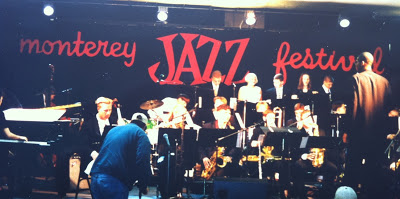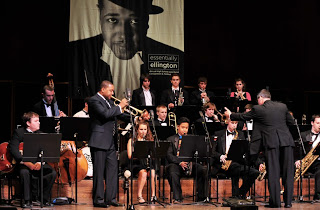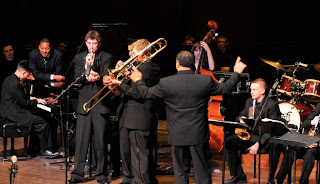| Numinous The Music of Joseph C. Phillips Jr. |
The Numinosum Blog
 Recently NPR's Patrick Jarenwattananon of A Blog Supreme asks: "Hey Seattle: is this 'Basically Basie' proposal a good idea?" Now being a former Washingtonian, I was interested to find out what Basically Basie was. From the Mission Statement on the link, I found out that the objective for Basically Basie is: The organization and promotion of an annual contemporary “competition and festival” anchored in the swing traditions of Count Basie, and patterned after the contributions of the Essentially Ellington program created by Wynton Marsalis and Jazz at Lincoln Center. And that's the problem. The past is like an anchor; it's comfortable and safe to be moored in a little stylistic cove. However you can not move forward if you don't lift the anchor and venture away to see what else is beyond it. Many of today's composers and performers have sailed away from that cove, yet Festivals like BB and EE, that emphasize "swing traditions," seek to go back to (or to stay put in) that stylistic cove. The Basically Basie idea by Paula Nodtvedt at jazzoids.com seems noble in intent however I argue that, especially for students, we do not need Essentially Ellington let alone another similar one in Basically Basie. While I haven't been a part of the Seattle scene for many years now, I still do have knowledge of and ties to what goes on educationally in the Seattle area because I was the former high school band director of award-winning bands at Interlake High School in Bellevue (read about bringing Maria Schneider to Interlake for her first performances in the Pacific Northwest-see three-part posts May 2010). So believe me when I say I think playing repertoire from the past along with learning the traditions and the basic lingua franca of past masters is VERY important and necessary for students. But assuming they have basic technical skills, students particularly during their novitiate, should learn about and play ALL kinds of jazz, not just swing and blues (despite Jason Marsalis' recent comments) and not just Ellington and Basie, no matter how great or important. And my problem with these festivals is that because of their high-profile, they put too much emphasis on one style of jazz over another, to the detriment of the student's overall education. In this, I am reminded of the debate in general education circles about the raising of standards through state and/or federal testing of all students. Sure high standards should be a requirement for EVERY student and teacher (read about some of my discussion of this in the Interlake-Maria story) and testing students is an important part of this. However, testing should not be the sole qualitative nor quantitative indicator of learning. For the best teachers, their focus is on individual achievement and how best to accomplish this, with preparation for a state/federal test as only one part of a well-balanced classroom. However, the danger in some classrooms is that the test becomes the driver of what mostly goes on in the classroom, with any learning not directly related to the test, deemed irrelevant and less important. Preparing for festivals like Essentially Ellington (and in theory, Basically Basie) because of their out-sized role in some schools minds as (falsely) representing 'the best' of high school bands, can result in a "teaching to the test" mentality. Of course this is a danger with any festival or competition, but with BB and EE, this seems an especially insidious risk with those impressionable future connoisseurs, consumers, and players being brainwashed (ah, influenced) by what jazz is (and is not) by the edicts of stylistic purity coming from the potentates of jazz. AACM founding father Muhal Richard Abrams tells Francis Davis in Bebop and Nothingness (Schirmer Books, 1996: 101), “If you're not oriented toward innovation, then by all means keep up the flame! That's important work. But the tradition also calls for change, for renewal, for innovation. In the beginning, jazz was an abstract process. It wasn’t any particular style yet. It sounded like whatever the musician wanted it to sound like. It stood for the freedom to experiment, the excitement of things never quite coming out the same.” When the standard of excellence of a festival is not how one can make the traditions your own, but rather how closely to the original past models you can emulate, this seems to me to go against the nature of jazz's origins and its spirit, as stated above. And while I agree BB (and EE) can bring and enthuse more bodies to the cause of jazz by celebrating "the rich heritage of Jazz as a central element of contemporary American music; by showcasing local, regional and national Jazz musicians, students and teachers, with the objective of maintaining the legacy of this music for future generations while increasing local audience participation," what kind of legacy and heritage do those Festivals leave students with, when they learn that it is more valued to sound like a facsimile of a band from a half-century ago rather than speaking the music language of today? that jazz is a series of fundamental, immutable standards (pun intended) or sounds like 'X' musician or group rather than a catholic philosophical way of thinking about or hearing music? I do understand that learning the fundamentals of any language are important: you must be able to read Lunch before Naked Lunch. But at this level we aren't talking about the basics. The students and bands at EE are fairly advanced and could (and should) be playing in a high-profile festival that celebrates ALL of jazz's legacy and heritage not just Basie, Ellington, and swing (I'm definitely not against festivals; competition, especially for high school and younger can be healthy, offering many lessons on perseverance, determination, how to win and lose gracefully, etc., and if it supplements and enhances a program, rather than dominating it, then great). If you want to have a festival that "celebrate[s] the rich heritage of Jazz as a central element of contemporary American music" why not rotate the focus? How about Totally Thad one year, followed by a Genuinely Gil, then a Mainly Maria Festival? Sure keep Ellington one year and Basie another; add Toshiko, Mingus, Brookmeyer in subsequent years. Or focus on styles of jazz, which could give things a more contemporaneous feel: Latin, electronic, soul jazz, free, jazz rock, whatever. And while you're at it, why not go as far as commissioning some of today's composers/arrangers to write/arrange music from or inspired by jazz greats who weren't big band players/writers (Coltrane, Ornette, Brubeck, Monk, Pat Metheny, Weather Report, etc.). Certainly this is a way to honor the past while recognizing that today's students should be intimately exposed to the writing and perspectives of today's large-ensemble jazz composers such as Jim McNeely, John Hollenbeck, Darcy James Argue, Guillermo Klein, Jason Linder, etc.). Frankly, a festival like this would REALLY show how much a school's program assimilated the total language of jazz, rather than a narrow focus on one person's music or one style of music (no matter how great it is). Pat Metheny in his keynote address to the International Association of Jazz Educators (IAJE) convention in 2001 challenged musicians “to recreate and reinvent the music to a new paradigm resonant to this era, a new time.”And Basically Basie or Essentially Ellington are doing this, how? To "recreate and reinvent" is difficult; it requires letting go of the past in order to find that future paradigm. Letting go doesn't mean forgetting or dishonoring the past. In fact I think by moving away from it you are honoring the past even more by recognizing that the future "stands on its shoulders." We must lift the anchor of the past in order to sail to the future. Now even though I no longer live in Seattle, I still love the city and still have ties to it (I'll be performing there with Numinous in the fall of 2011) so I'll answer Patrick Jarenwattananon's question at the top: Is this Basically Basie a good idea? I'd have to answer, no. (photo credits, from top to bottom: me conducting the Interlake High School Jazz Ensemble at the Monterey Jazz Festival in 1998; Roosevelt High School Jazz Band of Seattle, perennial winners of Essentially Ellington, with Wynton Marsalis in 2009 (from J@LC website); Garfield High School Jazz Band of Seattle, perennial winners of Essentially Ellington, with Wynton Marsalis in 2009 (from J@LC website)) POSTED BY NUMINOUS AT 5:57 PM update comment on BB blog:
Well, I think that from a marketing standpoint it might be an easier 'in' for people because the name Basie is a known commodity. However, I think the point of a festival would be to establish your own identity. If you have a great festival, the festival itself will be the draw, will be the 'in'. In the classical world here in NYC I can think of the Lincoln Center Festival as an example. Despite not being tied to a composer or performer (or really even any of the official Lincoln Center performing groups) the Festival has its own identity and has established itself as a place to hear all different kinds of interesting (generally contemporary) music, theater, etc. in the summer. Why not make this Seattle Jazz Festival it's own thing, rather than a facsimile of EE? Something that can be like the Lincoln Center Festival in its wide-ranging focus, yet featuring high school and local musicians. Sure you guys have Earshot and they do feature a wide range, but they are strictly professional players. To have a high school festival/competition that the ensembles would have to perform quality music that is not swing-based, would really set the Festival as something uniquely Seattle. Why be an ersatz EE, when you can be a primo Seattle Festival? Imagine high schools playing Ornette Coleman or Dave Douglas or some jazz/classical hybrids (like Gil Evans or myself or some of Hollenbeck's work; a festival that did that could bring in kids from the classical groups from the schools, perhaps doing a Metropole like focus one year. Talk about exciting! This would get not just the jazzers from schools involved but other kids who would not normally get to play 'jazz', but who might have an interest (and frankly, for many of those string and wind players, learning to play non-classical music will get them much farther in today's music world, than hoping for some orchestra gig to open up)). Now of course the problem might be finding directors or programs that think beyond the swing/straight-ahead paradigm but I'm sure they are there (sadly there weren't many others like me when I was teaching at Interlake, but perhaps things have changed since then). As I mentioned before, a festival like I proposed would be unique and would really set Seattle apart from anywhere else and also would point the students to what's happening today. As someone else mentioned, sure those groups that love swing and straight-ahead will find an outlet with EE or many other things, but for the truly adventurous directors and programs, I would implore you to make something different. Joe P.S. Yes the Basie and Beyond title is better, and might be much closer in spirit to something like the Mostly Mozart Festival (which while you'll hear some Mozart, you'll also hear new works as well-last year I heard John Adam's A Flowering Tree, an opera 'inspired' (but not mimicking) Mozart's Die Zauberflöte). A format like that seems to acknowledge that while the past is important, new and just as exciting things are happening NOW. Although frankly, something closer to a Lincoln Center Festival format, with its more wide-ranging focus, would be more interesting and would not be tied down with expectations (my guess is that the 'beyond' part would be less focused on by directors; that's why I think a rotating focus with different composers or styles would be more interesting pedagogically as well as musically-the Bard Festival also here in NY state, with its annual rotation of classical composers as the focus, could also be another model).
0 Comments
Your comment will be posted after it is approved.
Leave a Reply. |
The NuminosumTo all things that create a sense of wonder and beauty that inspires and enlightens. Categories
All
|
Thanks and credit to all the original photos on this website to: David Andrako, Concrete Temple Theatre, Marcy Begian, Mark Elzey, Ed Lefkowicz, Donald Martinez, Kimberly McCollum, Geoff Ogle, Joseph C. Phillips Jr., Daniel Wolf-courtesy of Roulette, Andrew Robertson, Viscena Photography, Jennifer Kang, Carolyn Wolf, Mark Elzey, Karen Wise, Numinosito. The Numinous Changing Same album design artwork by DM Stith. The Numinous The Grey Land album design and artwork by Brock Lefferts. Contact for photo credit and information on specific images.



 RSS Feed
RSS Feed